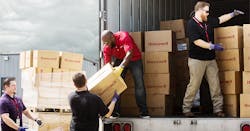Honeywell Donates $2M in PPE to Responders Effected by Hurricane
Honeywell has donated about $2 million in personal protective equipment (PPE) to support first responders and emergency personnel in efforts to assist their communities following the devastation of Hurricane Harvey.
Houston and other communities across southeast Texas face massive cleanup and restoration efforts in the wake of the storm’s torrential rain and flooding. Hurricane Harvey displaced thousands of families and caused billions of dollars in losses, including damage to the equipment and PPE that many fire departments and first responders need to respond to emergencies in their communities.
Honeywell, a global leader in safety products, will donate nearly 100,000 pieces of personal protective equipment to support first responders and emergency personnel in the region affected by the storm. This equipment includes safety clothing, protective footwear, rubber boots, safety gloves, disposable masks for respiratory protection, protective eyewear, hard hats and hearing protection. Also included are high-visibility T-shirts and coats for safety near roads.
“This past week has been an impossibly difficult one for many Texans as Hurricane Harvey caused mass devastation in Texas and along the U.S. Gulf Coast. Our thoughts are with the many thousands of families whose lives have been disrupted,” said Darius Adamczyk, Honeywell president and CEO. “In addition to supporting first responders, Honeywell will provide employees in the area with protective safety gear to support their personal needs along with emergency financial support through our humanitarian relief program.”
Delta Industrial Service and Supply, a Honeywell distributor in Texas, has been in contact with many local and regional fire departments about their equipment needs, and will coordinate distribution of the donated gear to fire departments.
Fire departments should contact Delta at 1-800-249-5292 for more information. “Under these extraordinary circumstances, we want to help volunteers, employees and our customers to be as safe as possible,” said John Waldron, president, Honeywell Safety and Productivity Solutions. “We are proud of the great work being done by first responders and so many others, and we are thankful for the ability to help those on the front lines who provide help where it is needed the most.”
Honeywell has nearly 1,000 employees across nine sites in the Houston metropolitan area along with another 100 employees in Orange, Texas. The Honeywell Humanitarian Relief Fund (HHRF) is supporting Honeywell employees who have been affected by the flooding, and the company is matching employee contributions to the fund dollar for dollar.
During the past decade, Honeywell has donated more than $9.8 million to support disaster relief around the world, and more than 1,400 employees have received emergency assistance. Through the relief fund, the company and thousands of Honeywell employees have responded with donations and support for long-term rebuilding efforts for recent tragedies such as the Japan tsunami, wildfires in Canada, tornadoes in Oklahoma, floods in Louisiana, and Hurricanes Matthew, Sandy, Ike and Katrina.
About Honeywell Hometown Solutions
The Honeywell Humanitarian Relief Foundation, is part of Honeywell Hometown Solutions, the company's corporate citizenship initiative, which focuses on five areas of vital importance: Science & Math Education, Family Safety & Security, Housing & Shelter, Habitat & Conservation, and Humanitarian Relief. Together with leading public and non-profit institutions, Honeywell has developed powerful programs to address these needs in the communities it serves.
For more information, please visit http://citizenship.honeywell.com/.
About Honeywell
Honeywell (www.honeywell.com) is a Fortune 100 software-industrial company that delivers industry specific solutions that include aerospace and automotive products and services; control technologies for buildings, homes, and industry; and performance materials globally. Our technologies help everything from aircraft, cars, homes and buildings, manufacturing plants, supply chains, and workers become more connected to make our world smarter, safer, and more sustainable.






